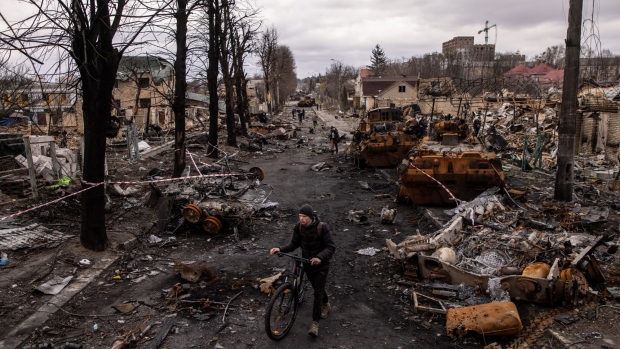
(Bloomberg) — International banks have warned the UK government that it must establish legal principles before it presses the button on the seizure of billions of pounds of Russian assets, otherwise it risks potential shocks to the global financial system and exposing institutions to legal action.
Sweeping international sanctions, imposed after Moscow’s invasion of Ukraine in February 2022, froze an array of assets including about $300 billion owned by the Russian central bank. Now, on the second anniversary of the invasion, a global campaign by politicians and activists is demanding that the assets be seized and the proceeds sent to Kyiv.
US Secretary of State Antony Blinken and his UK counterpart David Cameron are among those who have called for seizures, while political leaders in the European Union have been more cautious. About two-thirds of the Russian central bank’s $300 billion is stuck in the Belgium-based clearing house Euroclear.
That caution is echoed by some in the finance industry who told Bloomberg that they want the mounting political rhetoric to be translated into internationally coordinated measures to ensure that any seizures are lawful. Some bankers and lawyers in the UK warn that high-profile confiscations of assets risk damaging London’s reputation as an international financial center and could spark questions about the rule of law.
Cameron is expected to represent the UK at a meeting hosted by French President Emmanuel Macron in Paris on Monday to discuss support for Ukraine, at which the subject of asset seizures could be raised. But little progress is expected before a gathering of the Group of Seven leaders in Italy in June, people involved in the discussions said.
A priority for the banks is some form of legal protection, or indemnity, against any future action brought by Russia against individual financial institutions involved in the confiscation of assets, people familiar with the matter said. They declined to be identified discussing private conversations.
On Friday the US tightened its sanctions on Moscow after the death in detention of the Russian dissident Alexey Navalny last week.
“Everyone has said they want to punish Putin for Navalny’s murder, with actions such as 500 new sanctions in the US. That isn’t going to change Putin’s mind,” said Bill Browder, the former investor in Russia turned Kremlin critic. “Confiscating $300 billion of Russian money and calling it the Navalny Act would send a message that he understands.”
The full amount of Russian assets in the UK is unknown, but opposition Labour MP Chris Bryant last year said that about £26 billion of the central bank’s assets are in Britain, but some of that could be held within Euroclear.
Officials from several UK government departments are studying plans to seize assets ranging from property owned by oligarchs to money in their bank accounts. But the focus of most attention is Russia’s central bank. An alternative proposal to seizing the assets is to issue bonds, using the funds as collateral, which has also been discussed.
Another scenario — which has gained traction among the banks and within the EU — is to separate out the interest payments accrued on the seized assets and hand that to Ukraine, leaving the assets intact.
Finding an option that works for all will require cross-border co-operation, and the participation and agreement of the US, one person familiar with the UK discussions said. And it could become an issue for whoever wins the general election later this year, the person added.
Much of the hard work on the details of any agreed action is likely to fall to the G7’s Enforcement Coordination Mechanism, which has helped synchronize different countries’ sanctions against Russia, according to Charles Kinnoull, until recently the chair of the UK House of Lords European Union Committee.
Read More: Seizing Russia’s Central Bank Funds Is Illegal and Unwise
Financial institutions have told MPs and civil servants that any move to seize the money would require a clear audit trail to show the funds were going to Ukraine and make the process robust and transparent. They have also urged the government to take account of any pressure there could be on bank liquidity due to both sudden demands for the cash to be handed over or if other foreign investors — anxious about the seizure of assets — decide to pull their own funds, the people added.
Many bankers believe the most workable plan is to use the accrued interest rather than trying to take the underlying cash. And the EU has laid the groundwork for such an approach with a law introduced this month requiring those holding the seized money to separate out the profits. The EU estimates that about €15 billion ($16.2 billion) could be directed to Ukraine over the next four years, via this route.
“We and our G7 partners have repeatedly underscored that Russia’s obligations under international law are clear: it must pay for the damage it has caused Ukraine,” said a spokesperson for the Foreign and Commonwealth and Development Office. “The UK remains fully committed to working with allies to pursue all lawful routes through which Russian assets can be used to support Ukraine.”
–With assistance from Stephanie Baker.
©2024 Bloomberg L.P.





